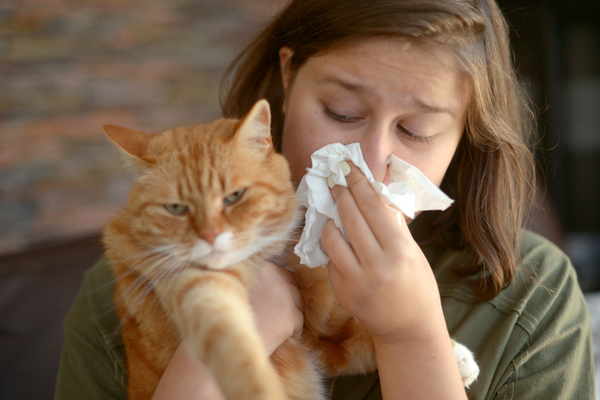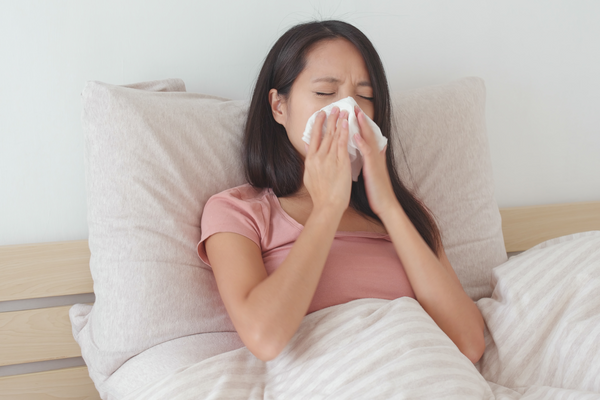The Ecology Works’ Guide for Traveling With Asthma & Allergies

Unless you like surprises and you’re okay with the possibility of a one-star motel stay, any kind of travel requires careful planning. Traveling with asthma and allergies is no different, except that your planning should consider what allergens and other conditions trigger your symptoms. You’ll also need to thoughtfully pack your bags to ensure you have everything you need to relax and breathe easy while you’re away.
More than 26 million Americans have asthma, and more than 50 million have allergies. Allergies and asthma are unique in that people with these conditions are usually dependent on the quality of the environment around them. Everyone has different triggers, but common allergens include dust mites, mold spores, animal dander, tobacco smoke, and pollen. Actively avoiding your triggers can reduce your risk of allergy or asthma symptoms. But when you’re traveling, it’s hard to know what triggers might pop up during your trip. Since new environments can be completely unpredictable, it’s vital to be prepared, especially if you’re traveling during the COVID-19 pandemic.
Enjoy your vacation – while reducing the chances of allergy or asthma symptoms – by following our simple travel guide.
Stay On Top of Your Treatment Plan
The best way to stay healthy on your trip is to be as well-prepared as possible before you go. Before you leave, pick up your regular over-the-counter medications and consider scheduling a check-up (or telehealth appointment) with your doctor or allergist. They’ll be able to refill prescriptions and review travel-related risks. They can also give you any immunizations you may need, especially a flu shot. Suppose you’re traveling a long distance or going on an extended stay. In that case, it’s also a good idea to ask the doctor for a letter explaining your condition and include medications or devices you may need in case of a medical emergency. If you have severe asthma or allergies, consider ordering and wearing a medical identification bracelet.
You can also work with your doctor to update your allergy action plan or asthma action plan. Your plan should include what to do in case of an emergency, a list of your prescription medications, and your doctor’s name and contact information. Here’s an example of an asthma action plan from the American Lung Association.
Check Allergy Policies
Dedicating a few minutes to researching allergy policies can make all the difference when it comes to having a safe, comfortable trip. If you’re traveling by plane, train, bus, ferry, or ship, check out the travel company’s allergy policies, or call the customer service line. Ask questions like:
- Are animals permitted onboard? If so, may I be seated several rows away?
- Is smoking allowed? Is there a non-smoking section available to book?
- May I pre-board to wipe down my seating area?
Book Non-Smoking, Pet-Free Accommodations
When booking your accommodations, be sure to request a non-smoking, pet-free room. This will help you avoid tobacco residue and pet dander. If your hotel or vacation rental can’t guarantee a smoke-free and pet-free room, consider staying elsewhere.
Packing For Your Trip
Before packing for your trip, having a list of your essentials will help put your worries at ease! It’s essential to consult your doctor, but as a general guide, those with asthma and allergies should pack the following:
- Pack your health insurance card and a list of medical conditions and medicines.
- Pack your medications with their original labels on them. If possible, bring backup medicines, especially if you’ll be traveling for long periods.
- If you’ll be flying, put all your medications in your carry-on luggage and keep them with you at your seat instead of the overhead bin. Medically necessary liquids and medications in excess of TSA limits are allowed in your carry-on bag, but they still must be screened. Remember, always keep your medications with you.
- If you or someone in your family has a food allergy or an insect sting allergy, be sure to bring your self-injectable epinephrine. These are allowed on airplanes.
- If you have a food allergy, pack safe foods to eat and your allergy alert chef’s card. If you’re flying, inform the TSA agent of your allergy at the beginning of the screening process.
- Consider packing face masks to wear as the COVID-19 pandemic continues, and in case you’re seated near animals, allergens, or other irritants as you’re traveling. Masks can help reduce your exposure to contagious illnesses as well as irritants that can trigger your asthma or allergies.
- Pack your asthma equipment (spacers, nebulizers, peak flow meters, and anything else you may require). If you use a nebulizer, it should not be left at home. A battery-powered portable nebulizer can be handy for those going on camping trips.
- To neutralize common indoor allergens like dust mites, animal dander, and pollen on your trip, pack an Anti-Allergen Solution. Our Anti-Allergen Solution is free of perfumes, dyes, and other allergy triggers and will not stain articles treated. Use it on carpets, upholstery, pillows, fabrics, hard surfaces, and other water-safe surfaces in your hotel room or vacation rental, and beyond.
- Pack an all-purpose allergy-friendly cleaner and disinfectant so that you can clean and disinfect high-touch surfaces such as your airline food table/tray and high-touch surfaces in your hotel room or vacation rental, like bathroom surfaces door knobs, etc. Vital Oxide is an all-in-one solution: a powerful cleaner, allergen neutralizer, soft-surface sanitizer, disinfectant, and more. Vital Oxide kills 99.9% of bacteria and viruses, including SARS-CoV-2, the coronavirus that causes COVID-19, in just five minutes. Vital Oxide is bleach-free, fragrance-free, VOC-free, and allergen-free and leaves behind no noxious odors or harmful residues. It’s the perfect travel companion for all!
During Your Trip
You’ve planned and prepared, and now it’s time to enjoy your vacation. To help ensure your trip is symptom-free, remember the following tips:
- Always carry your emergency medications and equipment with you everywhere you go.
- Know the nearest locations to seek medical treatment if needed.
- Stay hydrated and drink plenty of fluids.
- Avoid exposure to tobacco smoke.
- Reduce your risk of illness by frequent hand washing and the use of a disinfectant on high-touch surfaces.
- Consider wearing a mask in public areas during the pandemic, as well as flu season.
- If you’re traveling by car during high pollen or pollution times, travel with your windows up, and the air conditioning turned on. If you need to take allergy medication, keep in mind that some allergy medications cause drowsiness. It may be best to have a travel companion drive after you’ve taken an allergy medication.
- If you’re traveling by plane, ask if you can pre-board. First, tell the flight attendants about your medical condition. Before sitting down, use Vital Oxide to wipe down and spray your armrests and tray tables to disinfect. Avoid using airline blankets or pillows. If you have food allergies, consider only eating food that you packed with you.
Final Thoughts
Asthma and allergies don't have to interfere with your everyday life – or a much-needed getaway. Unexpected detours during travel can be fun, but only for the right reasons, not when they are health-related! Remember, with good preparation, travel is possible for people with allergies and asthma.





